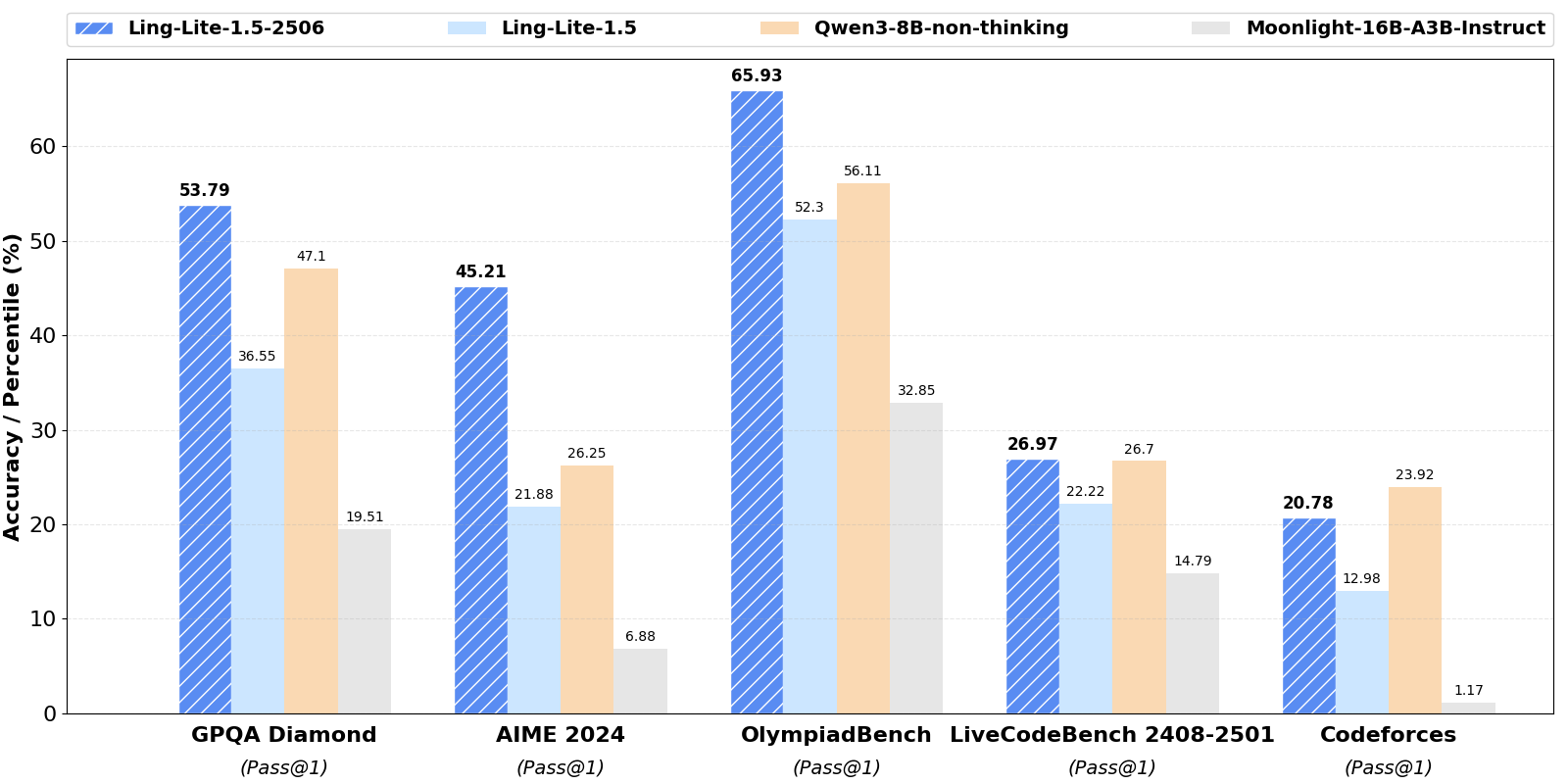Ling-lite-1.5-2506

Model Overview
We are excited to introduce Ling-lite-1.5-2506, the updated version of our highly capable Ling-lite-1.5 model.
Ling-lite-1.5-2506 boasts 16.8 billion parameters with 2.75 billion activated parameters, building upon its predecessor with significant advancements across the board, featuring the following key improvements:
- Reasoning and Knowledge: Significant gains in general intelligence, logical reasoning, and complex problem-solving abilities. For instance, in GPQA Diamond, Ling-lite-1.5-2506 achieves 53.79%, a substantial lead over Ling-lite-1.5's 36.55%.
- Coding Capabilities: A notable enhancement in coding and debugging prowess. For instance,in LiveCodeBench 2408-2501, a critical and highly popular programming benchmark, Ling-lite-1.5-2506 demonstrates improved performance with 26.97% compared to Ling-lite-1.5's 22.22%.

Model Downloads
You can download the following table to see the various parameters for your use case. If you are located in mainland China, we also provide the model on ModelScope.cn to speed up the download process.
| Model | #Total Params | #Activated Params | Context Length | Download |
|---|---|---|---|---|
| Ling-lite-1.5-2506 | 16.8B | 2.75B | 128K | 🤗 HuggingFace |
| Ling-lite-1.5 | 16.8B | 2.75B | 128K | 🤗 HuggingFace |
Quickstart
🤗 Hugging Face Transformers
Here is a code snippet to show you how to use the chat model with transformers:
from transformers import AutoModelForCausalLM, AutoTokenizer
model_name = "inclusionAI/Ling-lite-1.5-2506"
model = AutoModelForCausalLM.from_pretrained(
model_name,
torch_dtype="auto",
device_map="auto"
)
tokenizer = AutoTokenizer.from_pretrained(model_name)
prompt = "Give me a short introduction to large language models."
messages = [
{"role": "system", "content": "You are Ling, an assistant created by inclusionAI"},
{"role": "user", "content": prompt}
]
text = tokenizer.apply_chat_template(
messages,
tokenize=False,
add_generation_prompt=True
)
model_inputs = tokenizer([text], return_tensors="pt").to(model.device)
generated_ids = model.generate(
**model_inputs,
max_new_tokens=512
)
generated_ids = [
output_ids[len(input_ids):] for input_ids, output_ids in zip(model_inputs.input_ids, generated_ids)
]
response = tokenizer.batch_decode(generated_ids, skip_special_tokens=True)[0]
Deployment
Please refer to Github
License
This code repository is licensed under the MIT License.
Citation
If you find our work helpful, feel free to give us a cite.
@article{ling,
title = {Every FLOP Counts: Scaling a 300B Mixture-of-Experts LING LLM without Premium GPUs},
author = {Ling Team},
journal = {arXiv preprint arXiv:2503.05139},
year = {2025}
}
- Downloads last month
- 68
Inference Providers
NEW
This model isn't deployed by any Inference Provider.
🙋
Ask for provider support
Model tree for inclusionAI/Ling-lite-1.5-2506
Collection including inclusionAI/Ling-lite-1.5-2506
Collection
9 items
•
Updated
•
11